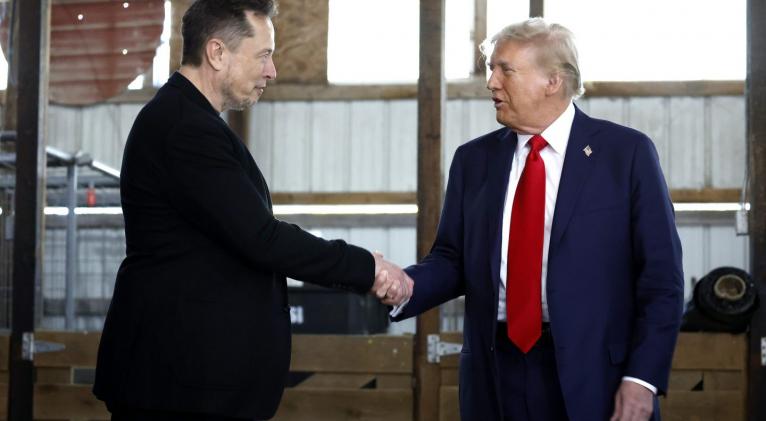Billionaires Take Center Stage After U.S. Elections
especiales

With the dissolution of the Soviet Union and its capitalist restoration, the world witnessed a veritable festival of fraudulent privatizations and appropriations of collective property by a small group of former apparatchiks, state bureaucrats, and Mafia-like businessmen. This was the great new capitalist class needed in the countries of the former Eastern Bloc to make capitalist restoration “irreversible,” as Western economists and technocrats liked to say at the time. What followed was a large-scale theft on the part of imperialist banks and Western political leaders, a process which functioned in the interests of the international capitalist class as a whole.
Yet the state remained the main actor in forming a new capitalist class in the former bureaucratized socialist states. To ensure that the state guaranteed and legitimized the wealth of this new bourgeoisie, certain oligarchs began to exert direct political influence on society, and even to hold political office themselves. The new capitalists’ close ties with the state guaranteed them enormous gains. At the same time, their participation in national, regional, and local governing bodies enabled them to adopt precisely the measures that favored their businesses. This interweaving was made easier by the context in which it took place: a troubled period of “transition,” a profound transformation of society and political regimes whose legitimacy was weak but whose nature was Bonapartist and authoritarian.
Big capitalists have always played a central role in steering governments. The bourgeoisie has a thousand ways of directly or indirectly influencing political life through its economic and political levers, as well as through the media. In the most powerful states, however, this interference is generally indirect. Rarely do major capitalists themselves hold political office. This indirect way of influencing political life and determining the state’s general orientations is a way to guarantee the legitimacy of the capitalist class.
It is striking, then, that billionaires are now assuming direct involvement in the U.S. government. As a symbol, the richest man in the world, Elon Musk, took an active part in the campaign for Donald Trump, who himself has an estimated fortune of $5.6 billion. He not only took part in rallies alongside Trump, but also used his social media platform, X, to influence opinion. To do so, he didn’t hesitate to spread fake news, relying on his millions of subscribers as well as a manipulated algorithm. The Financial Times has documented Musk’s activity on X in support of Trump, stating that
in the months leading up to the vote, Musk wielded his own megaphone — X — as its owner and the most popular account with more than 200mn followers. He flooded the platform with pro-Trump messaging, allegations about election fraud and warnings that Kamala Harris would destroy America should she win the White House. Over the course of 24 hours on Tuesday, he tweeted nearly 200 times, according to an analysis by the Financial Times, racking up about 955mn views, after averaging more than 100 posts a day in the month leading up to the vote.
Musk’s involvement, however, has gone beyond his frenetic activity on X and speaking at rallies. He was also the main financial contributor to Trump’s campaign, donating $132 million to his “friend.” He also “offered” a million dollars a day to Trump voters who signed a petition in favor of “free speech,” among other things. This “investment” quickly paid off: after Trump’s victory, Tesla shares gained 12 percent in value.
In exchange, Musk could be appointed head of the newly established Department of Government Efficiency, which would simply be responsible for laying off thousands of civil servants in the name of fighting “federal bureaucracy.” But Musk’s direct involvement in the Trump administration could also have consequences for the billionaire’s own companies. Musk’s fortune comes mainly from electric vehicle manufacturer Tesla and space exploration company SpaceX. It is more than likely that Musk’s presence in the president’s inner circle could influence decisions that favor his interests, and even give him even easier access to international leaders. As the Wall Street Journal writes,
Trump isn’t the only world leader that Musk has become chummy with, blurring business and geopolitics. He has had secret conversations with Vladimir Putin, contacts with China over its role in the electric-vehicle market, and flirted with meeting Narendra Modi over potential new business in India. He relies on foreign investors, with Saudis and Qataris among the largest X backers. These relationships could influence or complicate Trump’s foreign-policy plans.
Last September, Gideon Rachman of the Financial Times was alarmed by Musk’s role in U.S. foreign policy, stating that “his unpredictable interventions — combined with immense technological and financial power — make him an unguided geopolitical missile, whose whims can reshape world affairs.”
Musk is far from the only billionaire to have been involved in the campaign. As mentioned above, Trump is a billionaire himself and has received the support of 52 billionaires, the main contributors to the $392 million raised for his campaign. Trump’s supporters include Steve Wynn of Wynn Resorts, Miriam Adelson of Las Vegas Sands, and Ray Davis, co-owner and co-chair of the Texas Rangers.
But we shouldn’t conclude that the billionaires’ “participation” was solely in Trump’s favor. Quite the opposite, in fact. Many more billionaires supported Kamala Harris and the Democrats. Eighty-three billionaires donated to the Harris campaign, totaling $998 million. Bill Gates and Michael Bloomberg were among the top donors to the Democrats, giving $50 million and $100 million, respectively. In other words, 135 billionaires largely influenced and to some extent dictated the themes of the presidential campaign.
These exorbitant sums were spent to support a hollow campaign that was markedly to the right, on both sides, against a backdrop of competing reactionary rhetoric. They seem like an obscene provocation in a context in which voters’ main concern has been inflation and the economic situation in general. Marxist economist Michael Roberts explains the centrality of this issue as follows:
First, the U.S. real GDP may be growing and financial asset prices booming, but it is a different story for the average American household, hardly any of whom own any financial assets to speculate with. Instead, while rich investors boost their wealth, under the Trump and Biden administrations Americans have experienced a horrendous pandemic followed by the biggest slump in living standards since the 1930s, driven by a very sharp rise in prices of consumer goods and services. … Officially prices are still some 20 percent plus higher than before the pandemic but with many other items not covered by the official inflation index (insurance, mortgage rates etc) rocketing. … Mortgage rates have reached their highest level in 20 years and home prices have risen to record levels. Motor and health insurance premiums have rocketed. … If a worker has to take on a second job to maintain his or her standard of living, he or she might not feel so bullish about the economy. Indeed, second jobs have increased significantly.
Trump was very demagogic on the economic issue, which enabled him to capture a large proportion of the popular vote. Harris, claiming the legacy of the Biden administration in every respect, could not offer an alternative. But Trump is just as responsible for the economic situation and will have to face up to the crisis of American capitalism. In the coordinates of the crisis of U.S. imperialism, the direct participation of billionaires in political life could increase and be accompanied by tendencies toward the Bonapartization of the regime. From this point of view, we can expect an increase in anti-worker measures and repressive policies, as well as a possible intensification of class struggle and resistance — all against a government heavily influenced by cynical billionaires like Elon Musk.














Add new comment